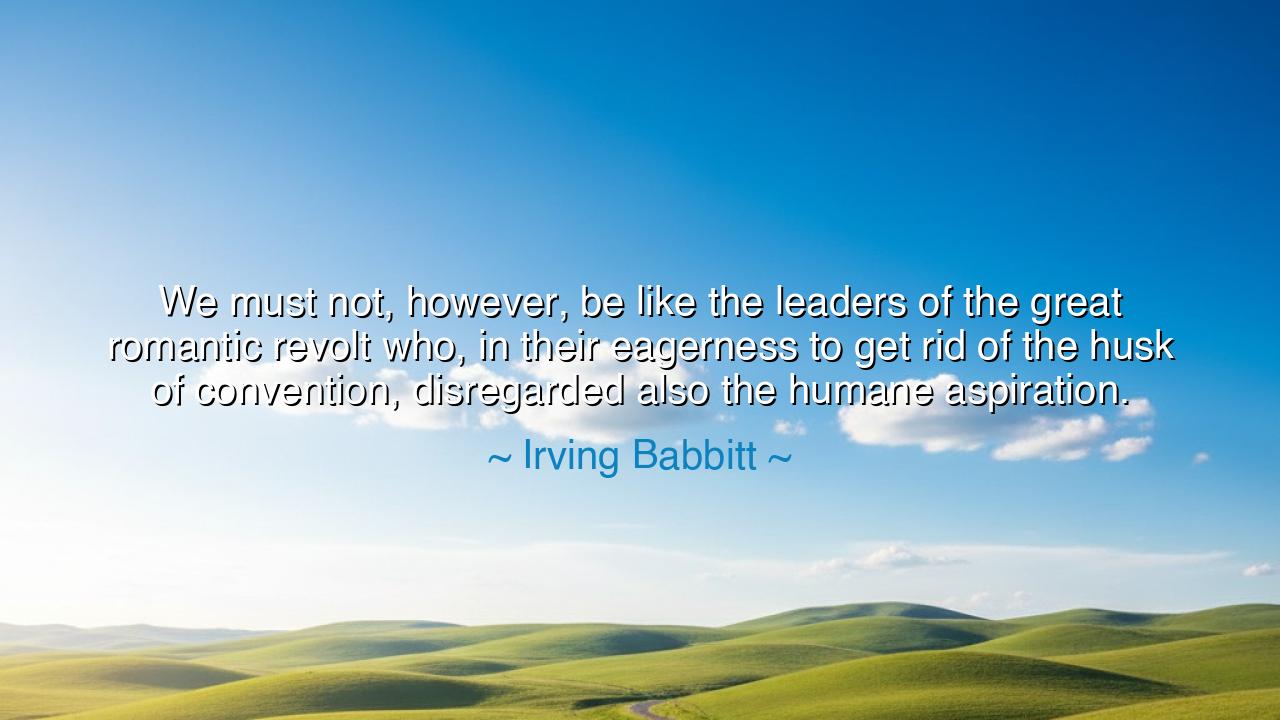
We must not, however, be like the leaders of the great romantic
We must not, however, be like the leaders of the great romantic revolt who, in their eagerness to get rid of the husk of convention, disregarded also the humane aspiration.






“We must not, however, be like the leaders of the great romantic revolt who, in their eagerness to get rid of the husk of convention, disregarded also the humane aspiration.” Thus spoke Irving Babbitt, a thinker who peered into the fires of modernity and sought to guard humanity from burning itself in the excess of passion. In his words is a warning timeless and universal: that in casting off the chains of empty ritual, we must not also discard the deeper truths that sustain the heart and soul. For the revolt of the romantics was noble in its beginning, but dangerous in its excess, and so it stands as a lesson for all who dream of freedom.
The romantic revolt arose against the lifelessness of mechanical thought, against the cold formalities of systems that reduced man to number and cog. It was a cry for individuality, for passion, for nature and imagination. In this cry was greatness, for it reminded mankind that to live is more than to obey, and that the human spirit cannot be contained by rigid convention alone. Yet, as Babbitt reminds us, the danger came when, in tearing down the husk of tradition, the romantics also tore away restraint, balance, and the sense of responsibility to the whole of humanity.
For history shows us that freedom without order becomes chaos, and passion without discipline becomes destruction. Consider the French Revolution, born in a blaze of ideals: liberty, equality, fraternity. The early romantic dreamers sought to overthrow the husk of monarchy and stale tradition. Yet in their zeal, they disregarded the humane aspiration—the call to mercy, balance, and justice—and so their revolt gave way to bloodshed, to the guillotine, and to the rise of tyranny once more. The husk was destroyed, but so too was the seed.
Babbitt’s words remind us of a higher balance. True reform is not the blind rejection of the old, but the careful sifting of what is dead from what still nourishes. The romantics, in their fervor, sought authenticity, but too often they mistook destruction for creation. A garden, when cleared of weeds, must still be planted with care, else it will grow wild and barren. So too must human society, when casting off empty convention, preserve the virtues of compassion, humility, and responsibility that keep life humane.
Consider also the life of Marcus Aurelius, emperor and Stoic. Though ruler of vast lands, he lived with restraint, holding both reason and compassion as guides. He too might have cast aside the traditions of his office, calling them husks. Yet he discerned what must be preserved: the duty to serve, the aspiration to be just, the balance between power and mercy. Unlike the romantic revolt, he did not confuse passion for principle. His reign, remembered for wisdom rather than chaos, stands as a testament to the union of reform with humane aspiration.
The lesson, then, is clear: when we seek change, let us not destroy recklessly. Let us preserve the flame of humane aspiration, even as we cast away the ash of dead convention. To reject all tradition is folly, for within the old lies wisdom; to cling to all tradition is cowardice, for within it also lies decay. The noble path is the middle way: discerning, patient, firm in justice, but tender in mercy.
Practical action flows from this truth. When you face the husks of life—rituals that no longer breathe, systems that no longer serve—strip them away without fear. But do not abandon kindness, dignity, and respect for others in your zeal. In every reform, in every personal change, ask yourself: does this preserve the humane aspiration, the higher call to love and justice? If it does not, then it is no true freedom, but merely rebellion.
So, children of tomorrow, heed Irving Babbitt’s words. Do not be intoxicated by revolt for revolt’s sake. Be bold in casting aside what is dead, but be wiser still in guarding what gives life. For the greatness of humanity does not lie in endless destruction, but in the careful cultivation of both freedom and compassion. In this balance lies the path not only to survival, but to greatness.






AAdministratorAdministrator
Welcome, honored guests. Please leave a comment, we will respond soon